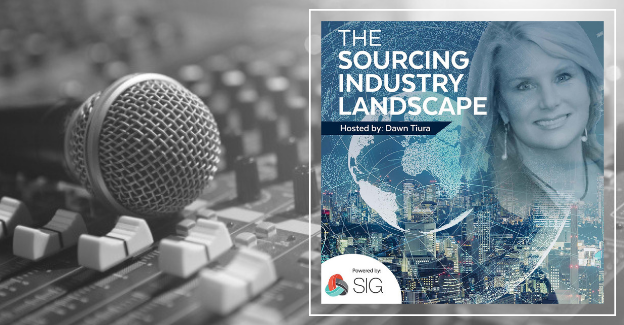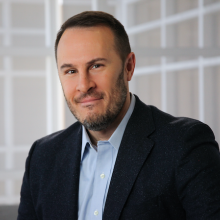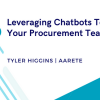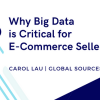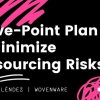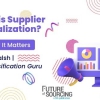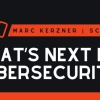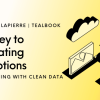In this episode of the Sourcing Industry Landscape, Dawn Tiura interviews Ian Barkin. Ian Barkin is Co-Founder and Chief Strategy Officer of Symphony Ventures, a professional services firm that helps enterprises leverage automation, artificial intelligence (AI) and innovative resourcing solutions. When it comes to implementing Robotic Process Automation (RPA) into workplace culture, Ian is sympathetic workers’ concerns.
Dawn Tiura: Hi, this is Dawn Tiura. I'm President and CEO of Sourcing Industry Group, also known as SIG. Now today I have someone who I like to think of as a friend as well as a professional colleague, and actually, a young gentleman that has impressed me so much since I met him a couple years ago. And I think his story will actually confound all of you as how he could have achieved so much in very few years actually overall.
Dawn Tiura: So today I'm welcoming Ian Barkin. He's a digital-ops sherpa, RPA industry veteran, speaker, here to help, and co-founder of the world's leading RPA and IA pure play and that would be Symphony Ventures. So Ian, welcome to the show.
Ian Barkin: Thank you so much Dawn. Great to be here.
Dawn Tiura: Yeah, and so I met you a couple years ago. I thought there was a couple young brash guys saying that they are going to be able to do robotic process automation and it's probably
all smoke and mirrors, and you guys have blown me away. You in particular. I'm just so impressed with your vision, your drive, and to have co-founded Symphony Ventures, which is easily the best consulting organization for RPA that we have ever run across. So, let's just talk about your personal journey. Is that okay?
Ian Barkin: Yeah, my pleasure. And thank you, by the way, for the kind words. I'm thrilled you think that. We've worked pretty hard to get to where we are. So where should I start? I can give background on just—my career and what I did.
Dawn Tiura: Why don't you start with—yeah, a little bit about your career and let's just wander through it. Then I really want to get to the point where you're obviously making it, and you were the global head of innovation at Sutherland, and then suddenly now you have this company. So tell us about your journey.
Ian Barkin: I think anyone who claims that there was method to madness after the fact is probably trying to clean up the story, but I was lucky enough that I bounced a few times in my career and picked up relevant skills and experiences and insights along the way that have served me pretty well in the last few years. So, I started in consulting,[I] was doing ERP implementations, actually—people soft implementations—and I didn't know it at the time, but it was exposing me to large enterprise-grade complex environments, and projects, and working with really dynamic teams. So, I did that for a while, and then I went into consulting. More management consulting, generally helping enterprises understand strategy and how they apply, at the time, what was the newest flavor which happened to be if you can believe it—the Internet.
Ian Barkin: So, sort of the e-business strategy consulting realm of: how do we use the internet to better serve our patrons, our customers, our clients, our citizens? And from that, I did learn quite a bit more about strategy and narrative. I met my wife. So, that was a huge win. She and I worked together at a consulting firm. And then, from there, I went into outsourcing. And it was actually—I followed a mentor. I followed somebody who had been sort of an advisor to me throughout my career who happens to be at a big business process outsourcing organization.
Ian Barkin: And got to then see real work being done. Got to see operations being set up; teams being hired and recruited and hired and trained and retained. And then had the luck of just watching that industry evolve from it being good enough that you could pull a labor arbitrage lever to then it no longer being good enough, and you needed to do insight and analytics and transformation and innovation. That kind of brings us to almost today where I just, I was lucky enough to be at the right place at the right time with the right challenge, that said, “you [have] got to do something differently,” because arbitrage is not going to win this next big opportunity.
Ian Barkin: So that's where we stumbled into what was not called ‘robotics process automation’ at the time, but now it is and so the rest is history. We saw an opportunity.
Dawn Tiura: So do you mind sharing the name of your mentor?
Ian Barkin: Yeah his name was Claude Hartrig. I've known him since, actually before I even started working. He was the one who introduced me to consulting and outsourcing, before I knew those were options for a career. As a kid you, what you hear is all the cool exciting things like traveling all over the world and that seemed really neat. So, I went into consulting partly to travel all over the world.
Dawn Tiura: Neat.
Ian Barkin: And ironically my first consultant job, I joke, allowed me to see all parts of New Jersey, and it was only until I moved into outsourcing that I got to actually see all parts of the world. But I have since had the privilege of developing tremendous friendships with people in India and Guatemala and China and Brazil and Germany and Finland. You name it, it's been an extraordinary journey. I wouldn't trade it for the world.
Dawn Tiura: That's awesome. So when you were at Sutherland Global, you were the head of the innovation labs. Is that when you first started tinkering around with RPA? Or tell me how did you get into that?
Ian Barkin: Yeah it was interesting. Again, it was all about sort of luck and location and timing in that it was a little bit before that, actually, a friend and partner of both of ours, Phil Furst, from HFS Research had published an article on Robotostan. It was actually November 1st, 2012, I fondly remember the date. And that report enlightened me and so many others to this idea that this software could emulate this work that people were doing. And after I read that, you can't help but think, “that sounds cool “and, “I want to do that if I get a chance to.” And then lo and behold as you said, I was given an opportunity to lead an innovation operation in one of the areas that we chose to focus on was robotic process automation.
Ian Barkin: And then again another good stroke of timing and luck there just happened to be an opportunity that benefited from the application of it, and that's where we really cut our teeth on RPA and proved to ourselves, as you said, that it wasn't smoke and mirrors and that this really was going to be game changing.
Dawn Tiura: That's neat. So now you're partners. Where did you meet them, and how did you guys come together to form Symphony Ventures?
Ian Barkin: Absolutely. It's a four musketeers story. We all met at Cap Gemini. So, David Poole, who is now CEO of Symphony was one of the individuals really integral in the establishment of Cap Gemini's BPO's operation. He was several levels above me and I had the privilege of working in the BPO practice and then soon after joining he actually set up an innovation lab within Cap Gemini and I had the opportunity to work in that.
Ian Barkin: So, I was part of a BPO Innovation Lab at Cap and then Pascal Baker, who is our Chief Client Officer, was closing big deals in Europe. He was a big deal sales guy rock star for the BPO practice in the UK and winning deals across Europe. Then David Brain, who is our Chief Operating Officer, and really one of the true visionaries behind what makes us so good, he joined Cap and—I'll let him weigh in whether it's fortune or misfortune—of getting to work closely with me several different times. So, he actually—he helped me within Cap establish a supply chain outsourcing practice and sort of the rest is history.
Ian Barkin: We stuck together over time. David and I then moved to two other firms, but always stuck together. Then, when RPA reared its head and we thought this is an opportunity to do something really interesting, you look for who you trust. You look for who you have faith in and who you know will be a partner on a journey that's, as you know as an entrepreneur, it's not always sunshine and roses, but you can trust your sort of your partners. That's what we have. It's been an extraordinary brotherhood in our case, that's got us to where we are today.
Dawn Tiura: So it's only been four years. Going on four and a half years right now, that you guys have been together, correct?
Ian Barkin: Yeah. Yeah. Actually, it's been about three and a half years.
Dawn Tiura: That's right.
Ian Barkin: It was the end of 2014. So, we're closing in on four years now. So yeah, it was the four amigos and then over time we've had the good fortune of working with tremendous organizations, tremendous clients doing big work and so we've grown the operations to—we're about 200 people, now—and have a global team. We've got folks in India and Poland and Mexico and the U.S. and in the U.K.
Dawn Tiura: Yeah, that's amazing. I've met two of the other partners and David and David and I'm so impressed with them. I just think you guys work together seamlessly and not competitively. So, it shows that you've had this camaraderie for a number of years because everybody just seems to build on each other rather than try and beat each other.
Ian Barkin: Yup. It's actually funny. There was a woman who worked for us one time and I explained the founders, the team, like I mentioned earlier. I explained it like a brotherhood. And the funny thing is—I never had a brother. I had a younger sister, so in my mind brotherhood meant camaraderie and supporting each other, but this woman happened to have triplets. So she had three boys. And when she heard brotherhood, all she heard was boys attacking each other and fighting for things. So, that is not what I meant by brotherhood but we truly do as you say: we communicate openly, we complement each other's…where one of us is weak, the other is strong, and we—I think it really has been testament to that, and just having four sets of shoulders to bear the weight of just entrepreneurship that has allowed us to scale as fast as we have.
Dawn Tiura: Has it been as much fun as you thought it would be?
Ian Barkin: Yes. I think so. You know, again, you certainly sign up for a lot of stress, and I don't mean that in a bad way. But a lot of responsibility when you take on the burden of building a team, building a brand, building a pipeline, keeping enterprises happy, keeping teams happy, meeting payroll. All of that. But it's truly been a joy the whole time. It's our baby and by our I mean the entire team's baby. We refer to ourselves as the Symphony Family, not by mistake. Everybody owns this company. Everyone is part of the story and part of the success.
Dawn Tiura: That's neat. So, where you do see Symphony Ventures moving toward? So, RPA...you guys proved it live at one our summits that it's real, it's here, it's now. And everybody needs to be doing it. So what is next? Is it just faster, smarter RPA? Is it new tools and technologies? Is it adding AI? Where do you see it going?
Ian Barkin: Yeah. I think—first and foremost it is going to become a fabric of how business is done or part of the fabric of how business is done, in the same way that people and computers and Microsoft excel are part of the fabric of how business is done. So, I think that RPA is here to stay. Enterprises will bed it into their operations front middle and back office in deeper and deeper ways over time. But as you say, it's really just the foundation because the story is much more than about emulating and replacing manual data entry with software that does the same thing. And the story is much more about data. And it's much more about real vision and transformation for enterprises and so as you rightly said, the next chapters are now that I've digitized my HR onboarding function, what is it teaching me about my business? And as a result of effectively time stamps for everything, you can start to really analyze that data.
Ian Barkin: In fact, I call this the ‘Renaissance for the Data Scientist’. I really do think that not only can individuals really put their minds to work on examining and transforming enterprises, but also algorithms can do the same thing; you can now feed machine learning with data that wasn't available before. So, I think that's going to be a big next step and it's not an easy one, because enterprises have a lot of really hard-working, smart, passionate people who have just been tirelessly working to keep the lights on, right? Just to keep to boat floating in operations.
Ian Barkin: So, no discredit to them at all, they've been doing a great job, but now that some of the burden can be off-loaded, we'll need to reskill and sort of redirect some of that passion and intelligence to the sort of higher order process redesign and experience design activities.
Dawn Tiura: Interesting.
Ian Barkin: I think that's what's coming next.
Dawn Tiura: So, sort of a light bulb for me came on because for years, and this is probably, I would say five, six years, people have been saying “big data, big data, big data.” And a lot of people are saying, so what? Nobody knows how to analyze this data, and this is how it's finally consumable data. We can actually do something with it. Make sense out of it and it just sort of takes it from this huge explosion of data into really incredible breakthroughs and thoughts and learnings. So, I love that that's really what it's going to start consuming is all that data and making sense out of it.
Ian Barkin: Right. And I saw this, I actually used to in covering the ‘Internet of Things’ trend, which actually used to be called machine-to-machine, about 16 years ago, I happened to play a part in that trend as well. I was always talking about how if you were to enable all of your devices, name it, cars, lightening ballast, vending machines, parking meters. If you gave them all the ability to start to share all the information about themselves, the status and transactional activity, it would overwhelm you. It would just come flooding out. So, yeah, you've got volume, but is there any value in that? And you just need to prepare yourself for it.
Ian Barkin: Same exact way in business now. In the old BPO era, again, people working hard to do lean, Kaizen Six Sigma projects, but it was via laminated number cards you'd post on the top of cubicles to say this is the number of phone calls I've taken, and then someone would be the runner that would write that information on a white board. That was how we did it. That was how you did the sort of Frederick Taylor time study, because it's the mechanisms that we had at our disposal at the time. Now, as you say, you're going to have a wealth of data. So, we truly will have big data in the enterprise, and now it's incumbent on us to do something with it.
Dawn Tiura: So, you came from an industry of outsourcing where when you would walk into a premise—you weren't the savior—you were the person that was possibly going to eliminate some jobs, or move them offshore or out of the company.
Ian Barkin: Yeah.
Dawn Tiura: Do people view you that way when you come in and start talking about RPA? Are you once again seen as someone that's a job-taker, or are you someone that's seen as—get rid of the grunt work, let us do the really important interesting stuff?
Ian Barkin: That's a great question. You've touched on something that I'm really passionate about right now and a real focus for me and some almost extracurricular research I'm doing. Because you're right. Because the narrative in the world right now is this idea that automation is going to take all the jobs, right? AI is coming for your job. I haven't seen it. In the four years that we've been doing this, and this is—sometimes people, CFOs are disappointed by that statement that I haven't seen all the jobs go away but I just haven't because enterprises always have more than they can and know they should do. And, they are growing and there is higher orders of service that you can offer.
Ian Barkin: So, more often than not, if tech out comes out, it's because of natural attrition glide path or you reallocate staff to other things. But I'm seeing people actually be really happy with the outcome of automation of tasks that truly were mundane, and things that did not get them up in the morning. It wasn't their favorite part of their job. So, that's one thing I'm seeing. I'm actually, I've started to interview people in our client's teams whose roles have changed as a result of RPA.
Ian Barkin: They were part of a…they were a process lead or a process owner or transactional subject matter expert prior to RPA, and now they are something different. Still associated with the function of the business, but RPAs allowed them to do a different role. I just wanted to hear their stories from them. So, I've actually asked my team to connect me with some of those individuals at various clients, and that's honestly the best discussion I have all week. I've had several interviews now and I just hang up giddy because they are so happy about their new role and what they get to do to apply their knowledge of the business and the process. Yet, do so with a greater degree of scientific rigor thanks to RPA.
Ian Barkin: So, I actually think it's a good news story, much more so than sort of the, sort of the FDE reduction impending doom story that seems to find its way into the headlines a lot.
Dawn Tiura: Well, you know what? I would love to do a podcast with some of the folks that you've been talking to and get that out there, because I see nothing but good news stories from people saying finally, we don't have human error and one system matches the other system and I'm freed up; I don't have to spend all this time looking for the errors and fixing it. So, I've heard nothing but happiness but I would love to get someone on the podcast that has gone through one of these transformations.
Ian Barkin: Right. And I'm taking notes as fast as I can while I'm talking to them, but there are comments like I feel like this job was made for me—about their new role. True excitement and passion in folks because of this transformation at work. Like I said, it makes my day, every time I have one of these conversations.
Dawn Tiura: That is so neat. So, for you personally, I mean I don't see you slowing down anytime soon and your light bulbs seem to be going off as fast as they can flicker, they turn back on. They flicker, they turn back on, and you keep going. So, what's next for Ian Barkin?
Ian Barkin: That's a great question. Obviously, I'm really passionate about this. I'm really passionate about the transformation of work and the role that it’ll have on jobs and people, and I think Symphony is a tremendous platform for that, so I don't see that changing in the next several years. We've got so many exciting new service offerings and platforms and teams opening up and projects that we're doing. So, I think that just gives me the wherewithal and the ability to just spread out and learn more about different industries and as you mentioned earlier, different tool sets, because things like cognitive and machine learning are getting better and better and more enterprise grade. I'm spending a lot of time right now just trying to figure them out, so that I have an informed opinions on them.
Ian Barkin: But, the other thing, and we segued into that with the discussion with individuals. The other thing that I'm really passionate about is the impact on the job market. And so, I am doing a lot of research on things like education reform, and talent upscaling, and rescaling. And in whatever free time I can find, I want to spend more and more time understanding how we as professionals really making this trend happen quickly—sort of the obligations that we have to contribute to the next generation.
Ian Barkin: I've got two young children who will be in this new workforce that I'm in some small way, I'm helping sort of shape and define for them, so I want to figure out how we educate, how we train, how we prepare the next generation to work more seamlessly with algorithms, and automations, and augmentation, and avatars, and all the ‘A's’ apparently. I just alliterated very nicely. But all the ‘A's’ that will be part of their future lives.
Dawn Tiura: Oh, I think that's fantastic, and I'd love for you to write some of this for Outsource and get it published out there and get your thoughts out there. I think it would just be fantastic to just get more professionals to start thinking about, as we change the way society works, we have an obligation to make sure that the next generation is prepared. And I think you're absolutely right. And I'm lucky enough to have three of my four, so three, my third is going to college this year and studying computers and he wants to be a Data Scientist, but I still have a 14-year-old that still has to go all the way through that. And figure out, because the world will be different by the time she gets in college and then out of college. It's going to be a completely different world. So, I'd like that-
Ian Barkin: Absolutely.
Dawn Tiura: -and anything I can do to support you or help get that word out, I would love to do that at SIG. And Ian, I have to tell you too, within SIG, people respect you and I love the fact that you volunteered to work with our RPA Group through the SIG Resource Center Thought Leadership Council. You bring a human side to RPA and both you and David, when you guys are there, you're real. You're human. You have compassion for people. You are very relatable and that is very unique for people that are as smart as you guys, to have the people skills and just the way you're talking about obligations that we have back to society shows that you're not the typical entrepreneur or typical nerd that’s out there running a tech company.
Ian Barkin: Thank you. I appreciate that.
Dawn Tiura: You're a compassionate nerd. How's that?
Ian Barkin: Aw. Thank you very much. There needs to be a t-shirt that says that. I'm going to spend the rest of my day designing that t-shirt. But no, and thank you for letting us be part of the SIG family. From London, we started working together, several years ago with that Build-a-Bot live on stage activity and the, just the network, the camaraderie, the closeness of your community, struck us immediately and continues to impress me to this day, and the passion that they have. As you mentioned, your RPA group is a lot of people who care a lot about contributing to the community. So, it's been a thrill to be part of. Thank you so much for letting us play some small role in it.
Dawn Tiura: Oh it's been very important to have people like you showing these executives that the world has changed, and it's not coming in five years, and you guys brought it right down to reality. And for us to be able to get the sourcing industry to be one of the first ones to fully embrace RPA is tremendous, and it's serving our desire, which is to elevate the CPO to really be the one that embraces change and be seen as strategic. So it's been so helpful.
Ian Barkin: And to that end too, you can go down the route of sourcing the lowest cost RPA license and that's what's happened in general, not particularly because of sourcing industry, but it was the behavior in the market for a while. It needs to elevate. It needs to become easier, because of this concept of, as HFS refers to it, as the ‘one office’ or this concept of general, sort of a holistic digital operation that enterprises have to figure out how to evolve to. It's—this is a much bigger story than the cost of a particular license or the type of software you choose. It's far more holistic. In anyway, if anyone can contribute to their organization but think look, we have a chance to fundamentally redefine our role in our industry by being digital about the way that we interact with our customers, interact with our employees, our patients, our citizens. That's the real trick. That's what's going to keep enterprises future proof.
Ian Barkin: To the extent that the sourcing community can play a role in that and opening the aperture for their organization, so that it's bigger than just a spot by of a particular component of that tapestry, is critical.
Dawn Tiura: I love it. So, alright you've had an exciting career and you're still young, but if you could look back 10 years and talk to your younger self, what kind of advice would you have given yourself? What would you have done differently?
Ian Barkin: That's a great question. I guess—probably a lot of things. One of them is I think that—spend the time to work really hard at the hard work. And just stay head's down. Work on understanding and becoming an expert in process improvement or software development, or whatever trade you're in. Whatever drives you, or perhaps whatever is sort of tangential but supporting your overall passion.
Ian Barkin: Just focus on that tirelessly. It's about hard work. I'd like to think I'm a pretty committed, passionate hard worker, but it really is just about putting in the hours, and then the other thing that I would say is more confidently build your network, right? Reach out to more and more people. I get the chance to do that more and more these days in my position, but I could have done it more freely ten years ago and interacted with the idea makers, the decision makers, the visionaries, the authors, the academics, because they are all very accessible, and they're the ones that start to inform your perspective on the future and what you're both interested in, good at, and the opportunities that you can sort of carve out for yourself.
Ian Barkin: I mean just like this. This discussion with you. I'm thrilled that we are friends and we get to speak as often as we do these days. And a relationship ten years ago would have put me in a better position. Symphony would be huge if I knew you ten years ago. So, that's I guess one of my recommendations to my younger, skinnier, healthier self.
Dawn Tiura: I love that. So Ian, I just want to thank you so much. You've given me lots of ideas for future podcasts. And lots of ideas for blogs and just ideas on other things we need to do at SIG. So, thank you for your time today and I hope you enjoyed the chat, and we will be talking soon. You know that.
Ian Barkin: Thanks so much Dawn. It was a real pleasure. Great talking to you.
Dawn Tiura: Thank you. And folks that's the end of our podcast today. This is Dawn Tiura signing off and hopefully you'll come and listen next week, too. Thanks, bye-bye.


